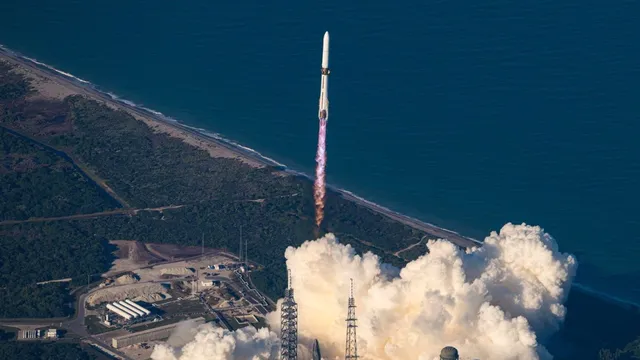- By Supratik Das
- Fri, 14 Nov 2025 11:30 AM (IST)
- Source:JND
Blue Origin New Glenn launch: Blue Origin’s heavy-lift New Glenn rocket completed a landmark mission on Thursday, placing two NASA satellites on their 22-month journey to Mars while achieving its first successful booster landing at sea. The flight, launched from Cape Canaveral after days of delay, marked a turning point for Jeff Bezos’ space company as it seeks to close the gap with industry leader SpaceX.
The mission lifted off under clear Florida skies after a week of uncertainties caused by weather fluctuations and an unusual geomagnetic storm. NASA, concerned about increased radiation levels, had earlier paused the Mars mission but cleared the rocket for launch once solar conditions stabilised.
Minutes after liftoff, cheers broke out in Blue Origin’s mission control as the 17-storey booster, nicknamed Never Tell Me the Odds, touched down smoothly on the barge Jacklyn. The company had failed its first recovery attempt in January, making Thursday’s achievement a critical step in its reusability efforts. Elon Musk acknowledged the milestone on X, writing, “Congratulations @JeffBezos and the @BlueOrigin team!”
— Jeff Bezos (@JeffBezos) November 13, 2025
ESCAPADE Begins Journey To Mars
Blue Origin confirmed that the upper stage had deployed NASA’s dual ESCAPADE Blue and Gold spacecraft into space. The satellites, built by Rocket Lab with scientific instruments from UC Berkeley, will reach Mars in 2027. They will orbit the planet for nearly a year to study its space-weather environment, solar wind interactions, and long-term atmospheric loss.
Leaving Earth… pic.twitter.com/ltSY1ycTtp
— Jeff Bezos (@JeffBezos) November 14, 2025
The mission, valued at around USD 55 million for NASA and USD 18 million for the launch contract, is expected to help researchers understand why Mars shifted from a warm, water-rich world to the cold, thin-atmosphere planet it is today.
New Glenn, named after astronaut John Glenn, delivers twice the liftoff thrust of SpaceX’s Falcon 9. The rocket is set to become Blue Origin’s primary vehicle for future Earth-orbit and deep-space missions. The company is simultaneously working on engines for ULA’s Vulcan rocket, a NASA lunar lander, and a proposed commercial space station.
Solar Storm Delays Fuel Baba Vanga Speculation
The launch sparked buzz not only for Blue Origin’s breakthrough, but also for its timing. A major solar storm that lit up skies across the northern hemisphere caused NASA to halt Wednesday’s planned liftoff, an event that quickly revived chatter around Bulgarian mystic Baba Vanga.
ALSO READ: Did You Know? This Oldest Interstellar Comet Was Born Before Earth, Mars And Even Sun Existed
For years, Vanga’s followers have circulated claims that she predicted intense solar events and global disruptions. The British Geological Survey recently elevated its space-weather alert to the highest level after two coronal mass ejections merged into what experts called a “cannibal storm.” The event disrupted radio signals, GPS accuracy, and triggered rare auroras across Europe.
While scientists emphasise there is no connection between folklore and solar activity, online discussions intensified as the storm coincided with renewed interest in Vanga’s broader predictions for 2025, including conflict in Europe and rising geopolitical tensions.

